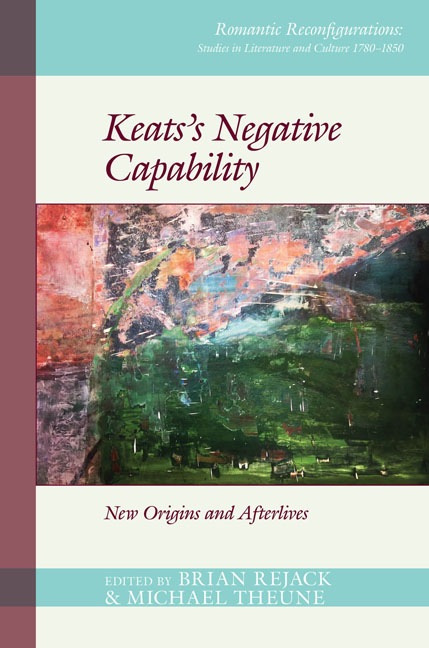Book contents
- Frontmatter
- Contents
- List of Figures
- Acknowledgments
- List of Abbreviations
- List of Contributors
- Preface
- Introduction: Disquisitions: Reading Negative Capability, 1817–2017
- Part I ‘swelling into reality’: New Contexts for Negative Capability
- Part II ‘examplified throughout’: Forms of Negatively Capable Reading
- Part III ‘pursued through Volumes’, Volume I: Negative Capability in Twentieth- and Twenty-First-Century American Poetry
- Part IV ‘pursued through Volumes’, Volume II: Adaptations, Appropriations, Mutations
- Afterword: Reading Keats's Negative Capability
- Bibliography
- Index
13 - Negative Capability in the Twenty-First Century and Romantic Self Annihilation in Philip Pullman's His Dark Materials
- Frontmatter
- Contents
- List of Figures
- Acknowledgments
- List of Abbreviations
- List of Contributors
- Preface
- Introduction: Disquisitions: Reading Negative Capability, 1817–2017
- Part I ‘swelling into reality’: New Contexts for Negative Capability
- Part II ‘examplified throughout’: Forms of Negatively Capable Reading
- Part III ‘pursued through Volumes’, Volume I: Negative Capability in Twentieth- and Twenty-First-Century American Poetry
- Part IV ‘pursued through Volumes’, Volume II: Adaptations, Appropriations, Mutations
- Afterword: Reading Keats's Negative Capability
- Bibliography
- Index
Summary
By now nearly everyone is familiar with Keats's musings on what he calls— precisely once—‘negative capability’ and that concept's sporadic unspooling over several letters written in 1817 and 1818. The idea has both demonstrated remarkable critical endurance and become so popular that poet and essayist Mary Ruefle has lamented its omnipresence that approaches near meaninglessness:
those words have become like a sickness unto death for me. As often as I have used them myself, I wish there were a moratorium on them for a decade, so overused are they, so bandied about that they have come to mean just about any thing one wants them to, especially a bebop version of Be Here Now, or a diffusive religious awe in which the poet wanders, forever in a stupor.
Similarly, Dan Simmons (a science fiction writer perhaps best known for his Keats-influenced Hyperion Cantos) refers to negative capability as ‘old hat, of course, drained of most of its vitality by high school English teachers’ and claims that, based on his ‘visits to colleges and writing classes, there certainly seems to be no lack of Negative Capability on campuses these days—classrooms and curricula fairly reek of it. John Keats could not have imagined an annulment of self so complete and devastating.’ However, despite its alleged ubiquity, a precise definition of negative capability has remained elusively protean since 1817, vacillating between a sort of synonym for ‘empathy’, to radical uncertainty, to the hallmark of what Simmons calls—adopting language from the end of Keats's negative capability letter—a writer ‘who obliterates all consideration beyond the sense of Beauty’ (p. 411). My intention in this essay is to suggest the ideas underlying some of the twentieth- and twenty-first-century appropriations of negative capability and how that critical tradition is reflected and ultimately challenged with a radically different reading of negative capability in Philip Pullman's His Dark Materials trilogy (1995–2000).
Pullman has repeatedly acknowledged his philosophical debt to romantic literature; even the epigraph to the final book, The Amber Spyglass, is a quotation from William Blake's America a Prophecy.
- Type
- Chapter
- Information
- Keats's Negative CapabilityNew Origins and Afterlives, pp. 203 - 215Publisher: Liverpool University PressPrint publication year: 2019



